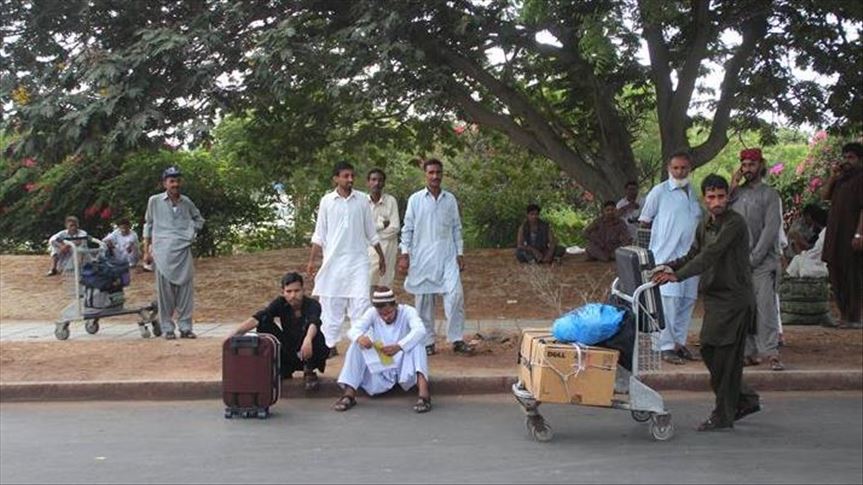
KABUL, Afghanistan
Juggling between tiring restaurant work and his studies, Mohammad Ibrahim, a 36-year-old man in the Afghan capital Kabul is enduring restless nights, as a much-awaited family reunion in neighboring Pakistan seems impossible this winter.
Ibrahim hails from Afghanistan’s majority Pashtun ethnic group that shares deep-rooted family ties with millions of its peers in Pakistan.
The recent flared-up rift between the two countries came at a time when usually the family reunions take place in relative warmer parts on the eastern side of the border between the two.
“I go home after working in a restaurant in the day and studying at a private college in the evening. Everyone — my wife, four children, my mother, sister-in-law and her children — are in grief due to the visa problem,” Ibrahim told Anadolu Agency.
This family was supposed to travel to Peshawar — capital of Pakistan’s northwestern Khyber Pakhtunkhwa province, located at a distance of some 280 kilometers (174 miles) from the Afghan capital Kabul — to escape the harsh winter and spend some enriching family time away from the raging war in Afghanistan.
“I have been spending hours, calling commission agents in Kabul [who used to fetch Pakistani visa for people like him against a certain amount of cash ranging from $100 to $500], visiting the Embassy of Pakistan and calling my friends in Peshawar for help, but nothing is working this time,” he sighed.
The scenes outside Pakistan’s diplomatic mission in the Afghan capital’s Karta-e-Parwan neighborhood were like of a movie theater with thousands of charged people, mostly men and some women, eagerly waiting for their turn to enter the consulate section to get the visa.
But, since Nov. 4, things have changed with relatively fewer people, mostly elderly and those with patients, idly sitting in hope of re-opening of the visa section closed by Pakistan in protest against alleged harassment of its diplomats.
“The Afghan Cd’A was informed that the Officers and Staff of the Embassy of Pakistan were being harassed over the past two days. They were obstructed on the road and the Embassy vehicles were also hit by motorcycles while going towards the Embassy,” said Mohammad Faisal, spokesman for Pakistan’s Foreign Ministry, as Islamabad announced closure of visa service in Kabul.
Call for harmony
On the same day, the Foreign Ministry of Afghanistan expresses its “deepest objection and concern over the summoning of the Ambassador of the Islamic Republic of Afghanistan to Islamabad, by Pakistan’s Inter-Service Intelligence and the misconduct of the entity’s personnel, and deems this action in clear contradiction with diplomatic norms and principles.”
However, the Afghan side promised to “seriously investigate” the claims made by Pakistan in regard to alleged harassment of its diplomatic staff in Kabul.
Responding to Afghan Foreign Ministry’s statement, Pakistan’s Foreign Ministry said Islamabad “extends due respect and courtesies and expect that the foreign envoys conform to the established diplomatic norms and principles.”
Having lived in Peshawar for years as Afghan refugee himself, Nezam Uddin, director for the Peace and Human Rights Organization, called on Kabul and Islamabad to make efforts for “harmony and greater public-to-public contacts instead of promoting divisions and hatred”.
“Why can’t the visa-free travel offered to the Sikhs between the two Punjabs [Pakistani side and Indian side of Punjab] be extended to the Pashtuns living on both sides of the border? The number of Pashtuns traveling back and forth between Pakistan and Afghanistan every day is many many times more,” he said.
Atiq Rehman, a Jalalabad-based author and political commentator, believes it would require exceptional political will on both sides to move ahead from the current confrontational stance to the one of cooperation.
Pakistan and Afghanistan share 18 border crossings. The most commonly used are northwestern Torkham and southwestern Chaman crossings.
Anadolu Agency website contains only a portion of the news stories offered to subscribers in the AA News Broadcasting System (HAS), and in summarized form. Please contact us for subscription options.





